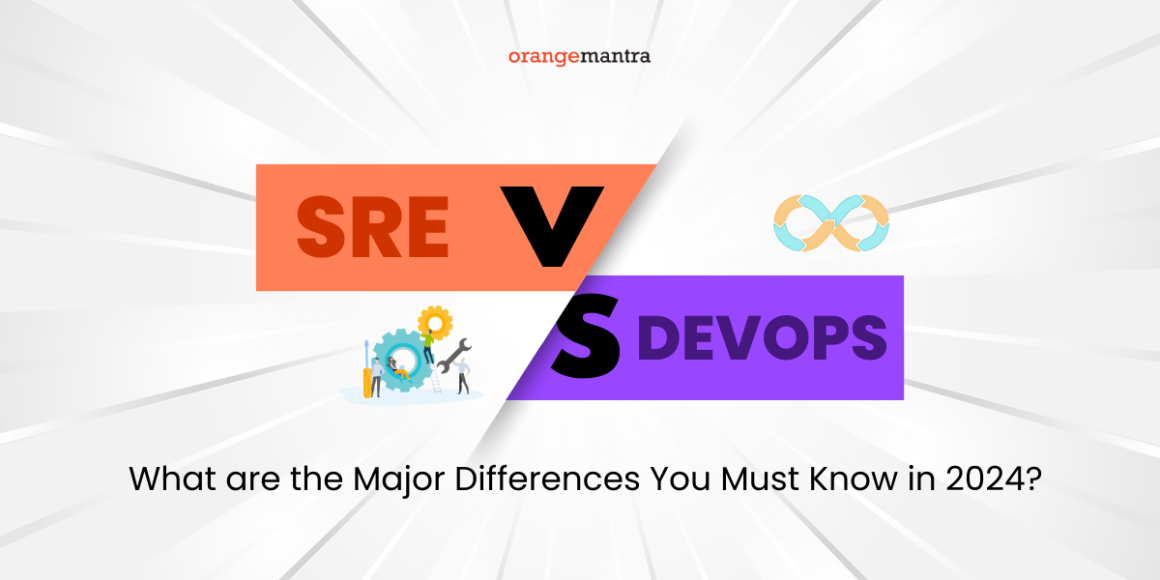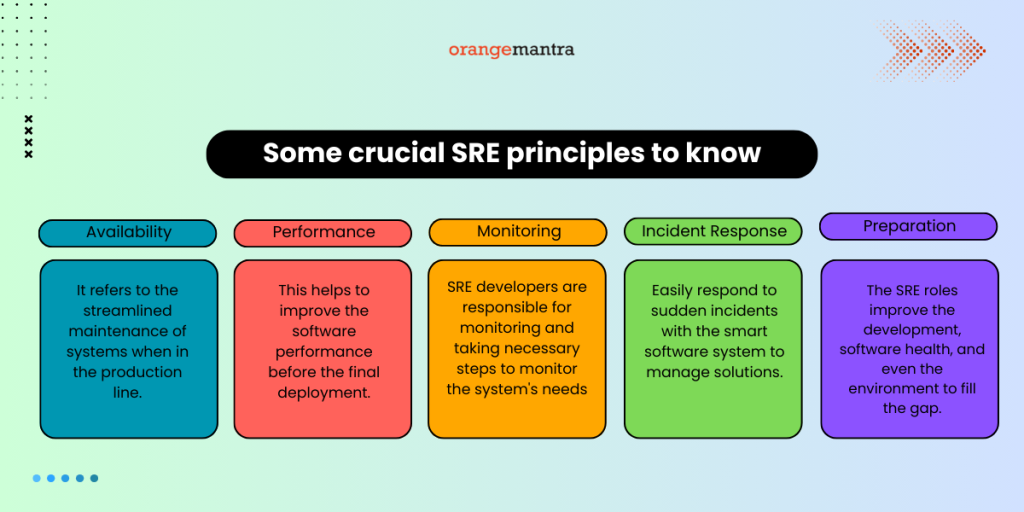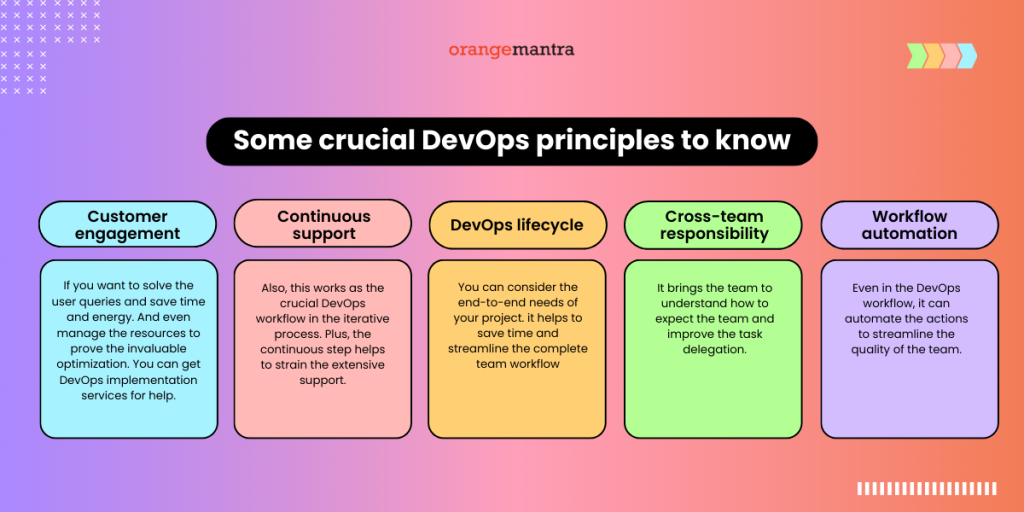In modern software engineering, two practices come up in discussions around system reliability and continuous delivery: Site Reliability Engineering (SRE) and DevOps. Yes, it is true that both SRE and DevOps bring development and operations closer but, they do so in different ways.
DevOps can control the structure and SRE controls the internal functions. This article presents the major differences between SRE and DevOps – what they are, how they work, the tools they use, and when to use each.
So, let’s dive in.
Table of Contents
What is Site Reliability Engineering (SRE)?
SRE is a discipline developed by Google to apply software engineering principles to infrastructure and operations problems. The goal is to build reliable, scalable systems through automation, monitoring, and continuous improvement.
SREs focus on:
- System reliability
- Automation
- Monitoring and incident response
- Performance optimization
Instead of relying on manual ops tasks, SRE teams build tools to automate processes like deployment, monitoring, and recovery. They also work with Service Level Objectives (SLOs) and Service Level Indicators (SLIs) to measure system health.
Core Principles of SRE
SRE solutions easily manages the process from development to operations. So, it assists in overcoming the loopholes, reports, and documentation. Even it helps to determine the new features and updates for the applications.
In SRE vs DevOps, the former takes a more engineering-driven approach to operations. Some crucial SRE principles to know are:
Availability: It refers to the streamlined maintenance of systems when in the production line.
Performance: Optimizing the speed and efficiency of applications.
Monitoring: SRE developers are responsible for monitoring and taking necessary steps to monitor the system’s needs.
Incident Response: Easily respond to sudden incidents with the smart software system to manage solutions.
Change Management: Enabling safe, fast deployments through automation and testing.
Common SRE Tools
Site Reliability Engineering teams rely on the automation of the processes. These tools help to streamline the technologies to support the SRE:
Containers & Orchestration: Docker, Kubernetes
Monitoring: Prometheus, Grafana
Incident Management: PagerDuty, Opsgenie
Source Control: GitHub, GitLab
Cloud Platforms: AWS, GCP, Azure
What is DevOps?
When talking about SRE vs DevOps, the latter offers a different way to manage. DevOps is a cultural and technical movement that integrates software development (Dev) with IT operations (Ops). It focuses on shortening the software development lifecycle and delivering features, fixes, and updates frequently and reliably.
There is also another term DevSecOps where security remains the top concern.
Core Principles of DevOps
DevOps solutions directly want to improve the current structure and performance of applications. It helps to upgrade the existing development and operations.
Plus, DevOps offers to replace the traditional approach with automation. Even it improves the collaboration between operations and development teams. Some crucial DevOps principles to know
Collaboration: When you hire DevOps engineers, they work with your existing IT and Dev teams through the entire lifecycle.
DevOps Automation: Reducing manual steps in integration, testing, and deployment.
CI/CD Pipelines: Automating code build, test, and release processes.
Continuous Feedback: Monitoring performance and user behavior post-release.
Security (DevSecOps): Integrating security practices into development from the start.
A Look at Some DevOps Tools
SRE vs DevOps helps enable different automation. DevOps offers different methods to enable faster delivery and efficient process. It helps with faster delivery, efficient automation, and enhanced connection. So, here are the tools used in DevOps sevices for the system.
CI/CD: Jenkins, CircleCI, GitHub Actions
Configuration Management: Ansible, Puppet, Chef
Containerization: Docker, Kubernetes
DevOps Monitoring Tools: Nagios, New Relic
Project Management: JIRA, Trello
Difference between SRE and DevOps
DevOps and Site Reliability Engineering mostly work toward similar goals: – such as better software delivery, automation, and system stability. They just take different approaches and emphasize different principles.
| Category | DevOps | SRE |
| Definition | A culture and set of practices for faster, reliable delivery | A role/methodology applying software engineering to operations |
| Main Goal | Improve collaboration and automation across teams | Ensure reliability, scalability, and performance |
| Team Structure | Cross-functional teams (Dev + Ops) | Specialized engineers with ops & coding skills |
| Focus Areas | CI/CD, Infrastructure as Code, automation | Monitoring, SLOs, incident response, system health |
| Approach | Cultural transformation, workflow automation | Engineering-driven ops with measurable goals |
| Metrics | Deployment frequency, lead time, MTTR | Error budgets, SLO/SLI compliance, uptime |
| Tools | Jenkins, Terraform, Docker, GitLab | Prometheus, Sentry, Kubernetes, PagerDuty |
Can SRE and DevOps Work Together?
Yes. In fact, SRE can be seen as a way to implement DevOps principles with a stronger emphasis on reliability and service-level objectives (SLOs).
DevOps defines “what” needs to be done. Tasks like automating deployments or improving collaboration.
SRE defines “how” to do it, with a focus on reliability engineering, observability, and performance under stress.
Many organizations combine both approaches to:
- Accelerate delivery (DevOps)
- Maintain reliability (SRE)
- Automate operations (both)
Which One Should You Use: DevOps vs SRE?
Ideally, you should combine both. Use DevOps to build collaborative and automated systems. Use SRE to make those systems more reliable and resilient.
Choose DevOps if you’re establishing a new development pipeline, want to improve delivery speed, or need cross-team collaboration.
Choose SRE when system reliability, uptime, and scalability become mission-critical and require dedicated engineering.
Conclusion
SRE and DevOps are not competitors but complementary approaches. DevOps sets the stage for better collaboration and faster delivery whereas SRE brings in engineering practices to maintain stability at scale.
We are assuming you have understood the strengths of both SRE vs DevOps by now. Moreover, you can consult our DevOps implementation services to build robust systems that are both fast to develop and reliable in production.
FAQs:
Is SRE a replacement for DevOps?
No, SRE is not a replacement for DevOps. Instead, it’s a way to implement DevOps principles with a focus on reliability and system engineering. DevOps emphasizes collaboration and automation whereas SRE applies software engineering practices to operations with measurable goals.
What is the main difference between DevOps and SRE?
The main difference lies in approach and focus. DevOps is a culture and set of practices aimed at improving collaboration and accelerating delivery. SRE is a specific engineering discipline that focuses on keeping systems reliable, scalable, and performant.
Can an organization implement both DevOps and SRE?
Yes, and many successful organizations do. DevOps can drive cultural change and process automation. SRE can bring in engineering rigor, system monitoring, and incident response. Together, they ensure fast delivery without compromising system reliability.
What role does observability play in SRE?
Observability is a core pillar of SRE. It helps SRE teams understand what’s happening inside a system by analyzing logs, metrics, and traces. With better observability, SREs can detect, diagnose, and resolve issues faster. SRE ensures systems remain reliable, scalable, and secure. It answers the crucial questions: What’s going wrong? Why is it happening? and how can we fix it efficiently?
Is DevOps cost-effective?
Yes, DevOps saves you money in the long run. It aims to automate processes. This means fewer manual errors and faster deployments. Also, it cuts down on rework and support costs. DevOps is especially valuable when you have complex infrastructure, frequent code changes, or need to handle scalable workloads and traffic spikes. It provides operational efficiency while keeping costs predictable.






